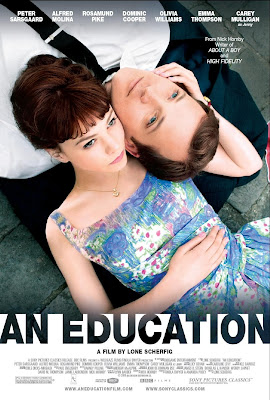Thursday, December 17, 2009
An Education (Movie Review)
Like Precious, An Education is a movie with really only one reason for being: a performance. An Education is not so much about anything as much as the charismatic screen presence of its young star, 24-year-old Carey Mulligan, just as Precious is unimaginable without the brooding yet stalwart presence of 26-year-old Gabourey Sidibe.
Both actors portray characters significantly younger than they really are. And there are other bases for comparison and contrast, as well. Both movies concern the education of their young female protagonists, and on a broader level both concern the value of education in general, specifically a bourgeois education, an issue about which An Education is somewhat more skeptical than Precious is.
Still, both films ultimately endorse a sort of faith in education, which to my mind, as an educator, never quite gels with other elements of the films' settings and plots. An Education at least at one point raises the problem that the utility of an education is (contrary to the received opinion) not self-evident, as an end to itself, yet both films simply resolve the issue by leaving a central premise (that education is indeed good) unproved and not deeply investigated.
An Education is a tale of a seduction, based on Lynn Barber's recent memoir, set in the early 1960s. Its protagonist Jenny is seduced by knowledge, both conventional knowledge (the study of French, appreciation for Ravel, King Lear) and forbidden knowledge (freedom, jazz, Russian cigarettes). Contrary to what a plot synopsis might suggest (Jenny becomes involved with an older man, played by Peter Sarsgaard), Jenny is less carried away by the idea of carnal knowledge: she has determined to retain her virginity until age 17 and, upon its eventual loss, seems rather let down that sex was no more than it was.
Without spoiling anything about the plot, it's safe to say that four-fifths of the film follows the slow evolution of Jenny's self-awareness and the sort of learning she wishes to pursue, and then radically shifts direction in the last part of the movie, seeming to come full circle ... or has it? What's dissatisfying to me about An Education is its last part, where a course of action is taken despite what we have come to question in the first four-fifths. The heroine makes a choice that seems hardly free, and yet we the audience are expected to see it as some kind of personal triumph for her.
I would have been more satisfied had the movie explored the reasons and implications of Jenny's final decision, with the same humorous and insightful detail that it explores her previous decisions. Instead, we get a montage: "The Student Prepares," it could be titled, comparable in some ways to the montage in Precious, in which successive images of Martin Luther King Jr, Malcolm X, Tiananmen Square, an opening flower, and Mahatma Gandhi stand in as a truncated "taste" of what education means, without ever making sense of how these disparate images relate to Precious's dismal reality.
At the end of An Education, we are told that paperbacks and postcards are "all you need," a perplexingly vague and reductionist claim (which, I would argue, only hints at Jenny's having risen to a higher level of consciousness), especially disappointing given the pains with which the movie portrays the character's development earlier towards a different conclusion. Even more puzzling is the film's last line, in which the character pretends to an ignorance (or lack of experience) that we and she alike know she has already lost.
So lacking a satisfactorily developed theme, in my opinion, the movie falls back on the unmistakable elan of its star. Yes, the reason to see An Education is to savor every shot of Carey Mulligan. She is pretty, with an innate intelligence shining through her eyes. She has a droll way with a snide bit of dialogue. Her facial expressions draw us into her dilemma, her distaste for conventionality (embodied by her parents), and her dignity and wisdom (beyond her years).
And that alone is quite enough to make for an entertaining and lightly satisfying film. But like other recent small-budget hits (Precious, Slumdog Millionaire, Juno) that rely on the winsomeness and charm of their young stars, it does not make for a profound film. For that, the filmmakers must have the intelligence and courage to pursue either intellectually or imaginatively (or both) the unwieldy implications of the story's subject, in this case, the question of whether an education is good and, if so, good for what.
Subscribe to:
Post Comments (Atom)

No comments:
Post a Comment